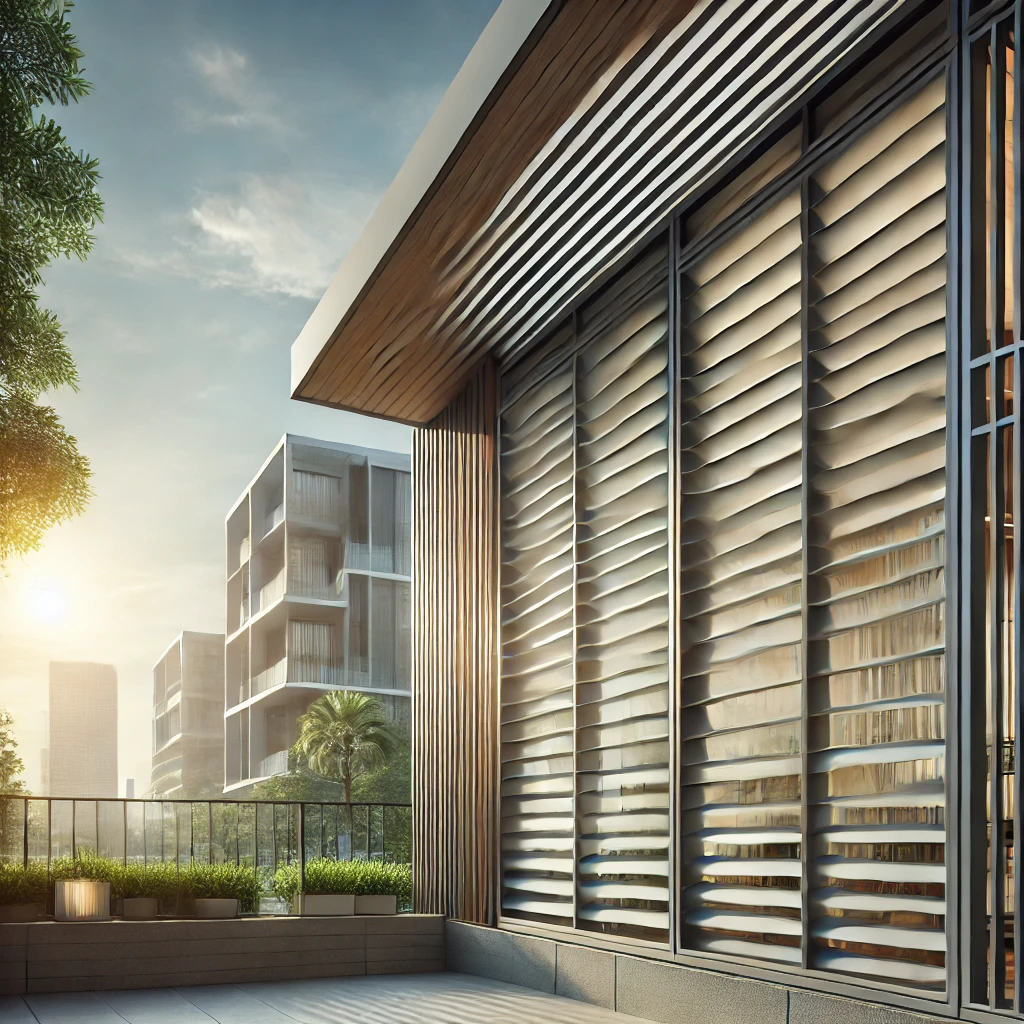![]()

Suited for homes in Kolkata, Durgapur and Bhubaneshwar
UPVC (Unplasticized Polyvinyl Chloride) louvers are advanced architectural solutions that combine functionality, durability, and aesthetics. Designed primarily for ventilation and light control, UPVC louvers have become an indispensable component in modern residential and commercial structures.
Key Features of UPVC Louvers
1. Durability and Weather Resistance
UPVC louvers are known to last long. Unlike traditional materials such as wood and metal, UPVC does not rust, rot, or warp. This makes it perfect for hot and humid areas like the cities of eastern Indian states, namely Kolkata, Bhubaneswar, and Patna.
2. Energy Efficiency
UPVC louvers reduce heat transfer due to their low thermal conductivity, which stands at 0.22 W/(mK). This enhances the energy efficiency of buildings, especially when trying to cut down on HVAC energy consumption.
3. Low Maintenance
UPVC louvers are maintenance-free. Simply wiping them with a damp cloth keeps them clean. Their resistance to UV rays ensures their color and finish remain intact even after many years.
Technical Calculations for UPVC Louvers
Ventilation Efficiency
Example Calculation: For a 100 sq. ft. room with a ventilation requirement of 10 air changes per hour:
- Required air volume:
- Airflow rate per hour:
- Using a UPVC louver with a free area of 60%:
- Effective free area:
- Required size of louver:
For a louver efficiency of 100 CFM (cubic feet per minute):
- Size needed:
This calculation ensures proper ventilation for optimal indoor air quality.
Energy Savings
Thermal Insulation Calculation:
- Heat transfer coefficient (U-value) of UPVC:
- Comparison with aluminum louvers:
- For a window measuring 2m x 1m:
- Heat loss for UPVC:
- Heat loss for aluminum:
- Savings:
Over a year (assuming 12 hours of cooling per day): - Total savings:
With an electricity cost of ₹6 per kWh, annual savings amount to ₹2,628.
Structural Load Analysis
Weight Advantage of UPVC Louvers:
- Average weight of UPVC:
- Compare with steel louvers (7.85 g/cm³):
- For a 10m x 1m louver:
- Weight of UPVC:
- Weight of steel:
By opting for UPVC, a reduction of 0.645 tons is achieved, significantly reducing structural load.
Use of UPVC Louvers
Residential Complexes
UPVC louvers are perfect for:
- Kitchen and bathroom ventilation
- Urban noise reduction
- Natural light while avoiding privacy invasion
Commercial Buildings
Office buildings and commercial stores benefit from UPVC louvers by:
- Providing economical ventilation
- Enhancing modern architectural designs
- Increasing energy efficiency to attain green building certifications
Industrial Usage
Factories and warehouses benefit from UPVC louvers through:
- Unhindered airflow and reduced heat storage
- Chemical resistance in harsh environments
The Science Behind UPVC Louvers
UPVC louvers are made of unplasticized polyvinyl chloride—a rigid, durable material without plasticizers. Key features include:
- Molecular Bonding: A high degree of polymerization ensures outstanding resistance to environmental factors.
- Low Thermal Conductivity: Minimizes heat transfer, ideal for energy-efficient buildings.
Benefits of UPVC Louvers Over Conventional Options
1. Fire Resistance Properties
UPVC louvers are inherently fire-resistant due to their high chlorine content, making them safer than wooden or metal alternatives.
2. Sound Insulation
With noise insulation up to 45 decibels, UPVC louvers are ideal for homes and offices near highways or industrial zones.
3. Eco-Friendly Manufacturing
UPVC louvers have a lower carbon footprint compared to aluminum or steel, and they are recyclable, further reducing ecological impact.
Advances in UPVC Louvers
Automated Louvers
Equipped with smart technology, modern UPVC louvers automatically adjust to:
- Sunlight intensity
- Indoor air quality
- Temperature changes
Double-Glazed UPVC Louvers
These combine UPVC with insulated glass to enhance thermal efficiency, ideal for high-rise buildings in extreme climates.
Anti-Pollution Coatings
Special coatings on UPVC louvers prevent dust and pollutants from settling, ensuring lasting performance and appearance in polluted urban settings.
UPVC Louvers: Industry Standards and Certifications
Quality UPVC louvers meet standards such as:
- ISO 9001: Quality management systems
- EN 12608: Specifications for unplasticized PVC profiles
- BS 476: Fire testing standards for building materials
Cost Analysis: Are UPVC Louvers Worth the Investment?
While the initial cost of UPVC louvers is slightly higher, their long-term benefits make them a wise investment.
Initial Cost vs. Maintenance Savings
- Wooden Louvers: Require frequent polishing and are prone to termites.
- Metal Louvers: Susceptible to rust, needing periodic painting.
- UPVC Louvers: Extremely low maintenance due to inherent durability.
Energy Savings
UPVC louvers conserve up to 30% energy, achieving a break-even point within 5–7 years, depending on electricity tariffs.
Practical Applications and Use Cases
Health Care Institutions
- Hygienic properties resist microbial growth.
- Easy to clean and maintain.
Colleges and Schools
UPVC louvers provide optimal natural light and ventilation, creating a comfortable learning environment.
Sustainable Architecture
Green buildings benefit from energy-efficient UPVC louvers, supporting certifications like LEED.
Intext Creative Solutions: Innovative UPVC Louver Technology
Intext Creative Solutions delivers premium UPVC louver solutions, offering:
- Custom Design: Tailored to your architectural needs.
- Expert Consultation: Recommendations for louver placement and specifications.
- Hassle-Free Installation: Professional services in eastern Indian cities.
Conclusion
UPVC louvers represent the future of sustainable architecture. For quality UPVC louvers in eastern India, trust Intext Creative Solutions to deliver top-notch products and services.
Leave a Reply